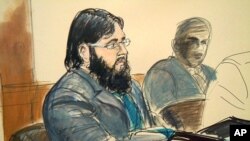A jury in Brooklyn will begin deliberating Monday in the case of a Bosnian-born U.S. citizen accused in an abortive subway suicide bombing plot in 2009.
Federal prosecutors told the jury that Adis Medunjanin was fully committed to a plot with two friends to detonate suicide bombs in crowded New York subways. They said Medunjanin suggested the attacks be timed during Ramadan, on September 11, 2009, and that the bombs could be assembled in the basement of the Manhattan apartment building where he worked.
Medunjanin's defense lawyers, however, said the Bosnian-born immigrant wanted only to defend Muslims when he traveled to Pakistan with his former high school classmates, Najibullah Zazi and Zarein Ahmedzay, intending to fight American forces in Afghanistan. They ended up instead at an al-Qaida training camp where they were asked to carry out a bombing plot in the United States.
Defense lawyer Robert Gottlieb attacked the credibility of the two chief witnesses against Medunjanin, Zazi and Ahmedzay, who pleaded guilty and testified in exchange for possible leniency in sentencing.
Referring to Zazi, who wept on the stand and said he loved Medunjanin, Gottlieb said, "Do not be fooled by the terrorist's tears. They are the tears of someone who will do anything to save himself."
Zazi and Ahmedzay testified that they and Medunjanin, all devout Muslims who had immigrated to the U.S. as children, became radicalized in their early 20s as they listened to Islamist tapes and online lectures urging violent jihad.
William Bratton, a former head of police in Los Angeles and New York City, says that is a common theme in terrorism involving U.S. citizens.
"In the case of the subway bombers, or the potential subway bombers, they were homegrown," noted Bratton, "but they were inspired by the external threat, they were inspired by the preachings of al-Qaida.
Zazi and Ahmedzay aborted the plan on September 10 when they realized they were being watched by law enforcement, according to their testimony. Medunjanin was arrested four months later, after he called an emergency line saying, "We love death more than you love life," and drove his car into another vehicle on a New York expressway. If convicted on all nine counts, he faces a maximum sentence of life in prison.
News
Jury Hears Closing Arguments in NYC Subway Bomb Plot Trial




